Singita has a collection of stunning properties, all centred towards sustainability
Want to learn more about sustainable travel
Speak with one of our experts
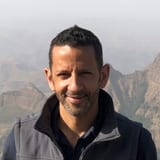
Ben

We spoke with Singita's Andrea Ferry about their sustainable travel initiatives


Singita are a well-renowned conservation and eco-tourism brand with beautiful properties throughout South Africa, Zimbabwe, Tanzania and Rwanda.
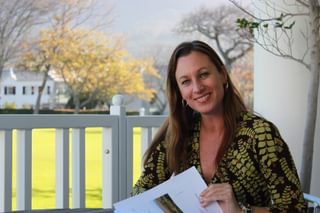
I spoke with Singita's Sustainability Coordinatior, Andrea Ferry about their involvement with sustainability projects throughout East and Southern Africa. From working towards making their beautiful properties sustainable, working with local communities and their commitment to conserving biodiversity.
Andrea has been with the Singita family since 2007 and for the past seven years has been part of the team managing the sustainability portfolio, driving the One Planet Living framework. Andrea holds a PhD in Business Administration from UCT's Graduate School of Business, with a research focus in employee behaviour change for sustainability.
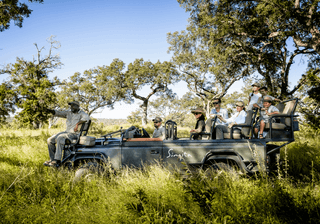
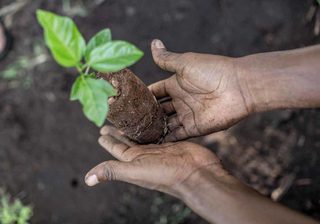
Singita’s ethos is slightly different to many organisations, where they would have sustainability as their main umbrella which would diversify to environmental, community, conservation etc… Singita’s orientation works slightly different with conservation as the over-arching umbrella. And, why it’s done this way is because its whole vision and purpose is the conservation of wilderness areas in Africa for future generations.
We focus on three core areas. Biodiversity, Community and Sustainability. With each core area in turn diversifying into other categories.

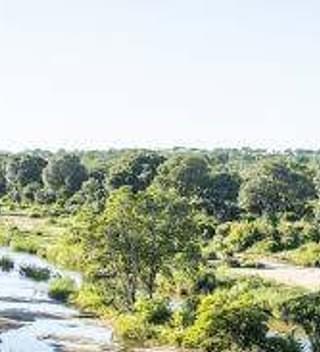
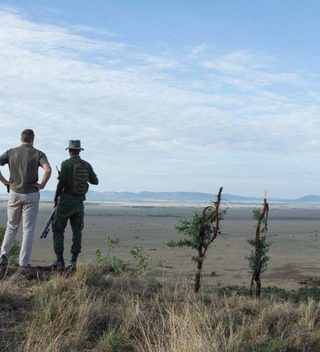
Community education - We help with all manner of education levels from early childhood development right the way through to scholarships and adult education by giving people access to quality education and skills development. All aimed at improving quality of life whilst educating the need to value and conserve their natural heritage.
Enterprise development - helping business in our local community to thrive and grow by us supporting them, providing mentorship and a market to help them develop. This means that communities can become far less dependant on land that is being protected, giving them an alternative source of income and food.
Environmental awareness - if we can educate communities on the value of conservation then they are more likely to respect what is happening on a reserve and more likely to see how they can benefit, without the need to follow the path of turning to poaching or taking and burning firewood from within the reserve. Community engagement through various avenues such as environmental education are vitally critical as we understand that biodiversity, community and sustainability are all intertwined.
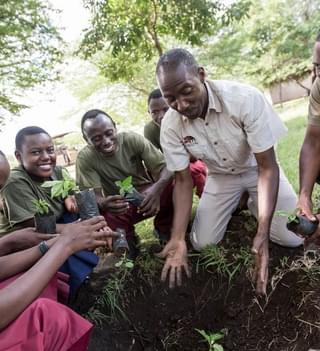
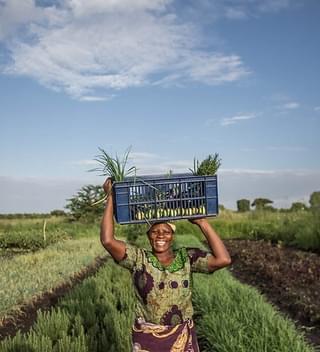
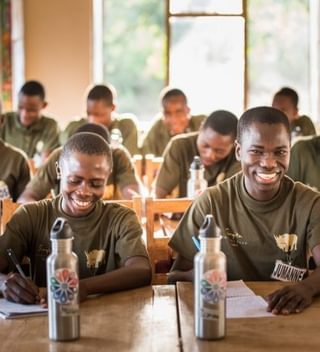
Everything we do is taken into consideration from the construction and operations of the lodges and so on. We strongly believe in the One Planet Living framework and this helps to structure what we do around our sustainability programs. We strive to bring those principals to everything we do including the other core areas of community engagement and our biodiversity work.
Even decisions at board level take sustainability into consideration, with directors ensuring that decisions made are inline with the company's sustainability ethos. A sustainable world is one in which people enjoy happy, healthy lives within their fair share of the earth’s resources, leaving space for wildlife and wilderness.
Read more about Singita's dedication to 'One Planet Living'
Singita recognises the interconnectedness between all these aspects, we consider these holistically. We also partner with experts. We realise we don’t have all the skills needed to accomplish this internally.
How we action these is strongly driven by our Vision: to preserve and protect large areas of African wilderness for future generations.
Sustainability is key to the future of preserving and protecting large areas of African wilderness. It is a combination of guests staying at our lodges, together with partnerships on various different levels that enables us to pursue our vision.
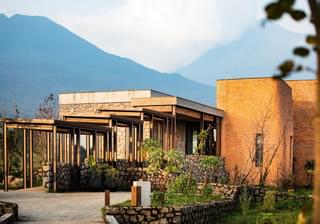
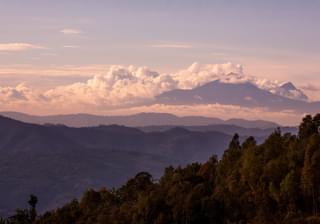
Sustainability is not a fad or a trend, it’s a movement, it’s a significant shift in how we do business. So, it is vitally important for brands to embrace sustainability. If they are not, they are already way behind the curve of guest/ consumer expectations.
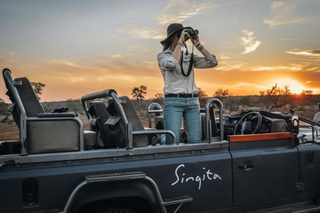
Consumers expect luxury brands to have embedded sustainability and be talking about it, its not an ‘extra nice to have’. This is particularly relevant in the eco-tourism industry where the very product is what sustainability is trying to preserve and protect. Acting unsustainably in a fragile natural and/ social environment, is inconsistent with an ecotourism brand, and guests/consumers will quickly see through this.
Well-recognised and loved brands embracing and promoting sustainability sends the signal to others that this is ‘business as usual’; that this is what is expected, this is the norm and that drives broader systemic change.
1. Sustainable Materials: By the end of 2020 Singita will have eliminated single-use plastics.
2. By 2025 ‘off-grid’ lodges 80% powered by on-site renewable energy and on-grid lodges 30%.
3. Sustainable Water: By 2025 Reduced water/ bednight by 30% from baseline year.

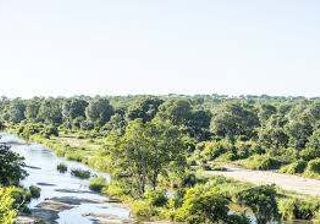
For our community programmes, the shift from trying to be everything to everyone, to narrowing our focus on what we can do well and what makes sense in terms of our business.
For example, the introduction of our very successful Singita Community Culinary Schools provides international Chef’s accreditation for the students who graduate from the programme, as well as experience in high-end kitchens at the lodges. Students are drawn from the immediate community and often stay on with Singita in the kitchens.
The biggest hurdle was and is the integration of sustainability into Singita’s operations at all levels.
By using a Framework and developing its brand internally, Singita has been able to reach all levels of staff, build awareness, train and engage them on sustainability principles and how this applies to their work. We now see depts driving their own sustainability agendas, rather than it being driven in a top-down approach by head office.
The shift from being conservation specialists, to expanding to conservation initiatives with ways to physically protect the wildlife under our care from poaching. This is still a huge challenge, but it is one Singita and its non-profit Conservation Partners are working hard on and are seeing successes.
Examples of how far we have progressed include the introduction of K9 antipoaching units and the use of advance detection technologies (drones, advanced radio technology). The training of game scouts is intensive, both physically and mentally but this ensures that we can be prepared and at the top of our game in the fight against wildlife crime across our conservancies.
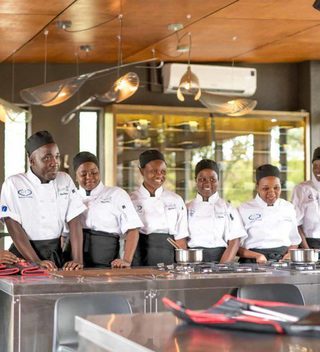

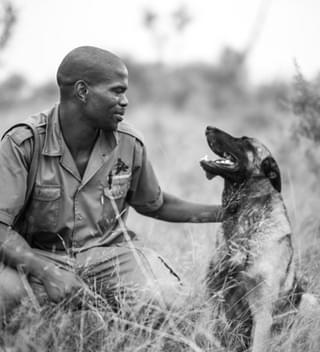
There are many, but a current programme that is proving successful is the Covid-19 food relief programme by the Singita Lowveld Trust. Its success is due to its transparency in selection of families to receive food parcels, leveraging off existing logistics structures and partners, and being able to tap into our broader Singita family of past guests and followers who have been so generous. July 2020 saw 630 comprehensive food parcels delivered to families in need of help.
Read more about Singita's Covid-19 Food Relief Program.
Tackling carbon emissions is critical. Installation of what at the time was Southern Africa’s largest off grid hybrid solar PV/ battery system at Singita KNP. With over 1Megwatt of solar capacity and over 3 Megawatts of battery storage the systems allows the lodge and staff villages to run some months without the diesel generators on at all. It has slashed our diesel consumption and carbon footprint. Other benefits include a quieter lodge and reduced risk of diesel spill. Now over half our lodges rely on solar powered energy and we aim to keep moving in that direction.
Singita, along with their Tanzanian conservation Partner, The Grumeti Fund, have again secured the traversing rights to vast areas of the Serengeti's Great Wildebeest Migratory route - over 350,000 acres. This is accomplished by purchasing the hunting rights to the area but instead using them for conservation and preservation of the wildlife. This has seen a marked increase of wildlife and game numbers in the region, in fact in increase by four-fold.
Another success story is over 5,000 poachers have been arrested since the inception of Singita and the Grumeti Fund's partnership which was created only 15 years ago.


One of the biggest drivers of sustainability is having a culture of sustainability among employees. This means ideas are generated and actioned from all over the organisation rather than being driven by one person/dept.
One small idea that has added to the embedding of sustainability culture came from Singita Sabi Sand. A wall mural was created with the Sustainability Principles where staff could see it on their way to work. Each principle has a space to chalk up pictures or comments. Every month different departments take their turn to write up their ideas, comments, words of encouragement etc... It’s been an easy, inexpensive, visual and fun way to keep sustainability front of mind among employees and now every single lodge in the group has one – some bigger some smaller, but still with the same function.
Travel and safari companies throughout Africa have always had a mindset of sharing the natural world around them with wildlife, coexisting with as minimal an impact as possible. Yes, some organisations are better equipped than others but through the Far and Wild Sustainability Project, we want to share as many good news stories as possible – it’s about helping those who want to become more sustainable and connecting them with others who can share their experience.
Whether you’re a client wanting to travel more sustainably or a safari organisation looking to reduce your carbon footprint and become climate positive, get in touch, we’d love to share some good news stories, telling you about some of the amazing projects our suppliers are involved with to make sure that the planet remains a beautiful place for our children’s’ children and so on…
View examples of Singitia's collection of 15 award-winning lodges and camps.
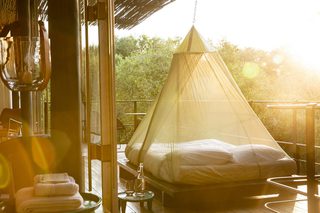
Exuding subtle sophistication, Singita Sweni Lodge is hidden among a canopy of trees ensuring a luxury and intimate safari experience. Nestled into the banks of the Sweni River, this intimate lodge is a hidden jewel that provides a bold, new African context for contemporary design, architecture and cuisine.
Find out more about Singiti Sweni Lodge.
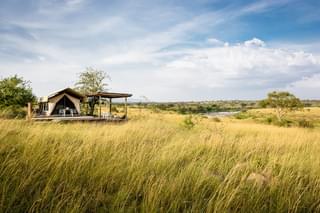
Situated in the northern most tip of the Serengeti National Park, Lamai Triangle, Tanzania, Singita Mara River Tented Camp offers guests the chance to spend time in this stunning yet remote area, with one of the highest concentrations of wildlife in the Serengeti National Park. This combined with Singita's world-renowned refinement makes for a simply stunning safari experience
Read more about Singita Mara River Camp.
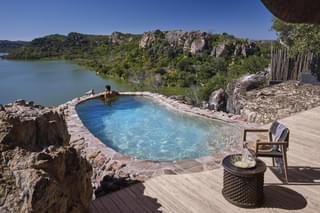
Singita Pamushana, a magical and luxurious safari experience located in Malilangwe Wildlife Reserve, on the borders of Gonarezhou National Park in South Eastern Zimbabwe. Home to the Big Five, including both species of African Rhino, the reserve is also inhabited by wild dogs, crocodiles, giraffes and many more. A full-hearted safari experience with game walks, boat safaris and even your own private plunge pool.
Read more about Singita Pamushana Lodge - Zimbabwe.
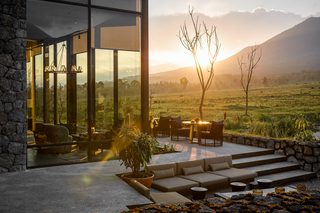
Situated on the boundary of the Parc National des Volcans, Kwitonda Lodge is immersed in 178 acres of lush meadows and wetlands. With stunning uninterrupted views of the mountainous, forested national park, the sustainable lodge sits snugly within the dramatic Virunga Volcano Chain. A contemplative and nurturing place, there's no better way to experience the gentle regenerative spirit of Rwanda.
Speak with one of our experts

